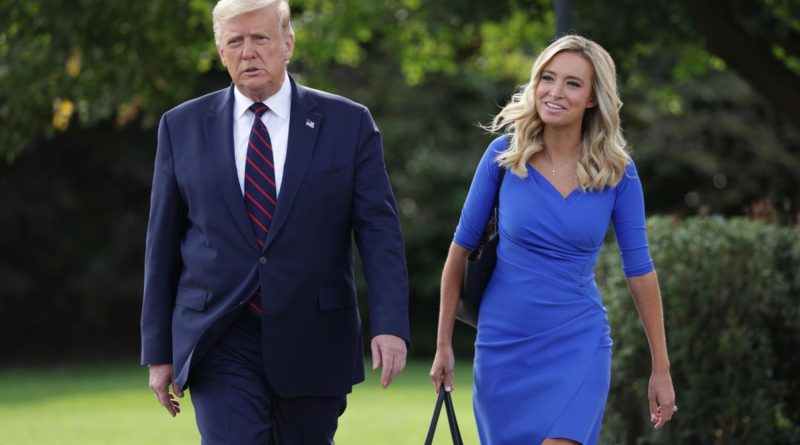Trump Says With ‘A Herd Mentality’ Covid-19 Coronavirus Will Go Away

U.S. President Donald Trump, seen here with White House Press Secretary Kayleigh McEnany departing … [+]
Getty Images
During an ABC News town hall in Pennsylvania on Tuesday, U.S. President Donald Trump once again insisted to host George Stephanopoulos that the Covid-19 coronavirus would just “disappear” even without a vaccine. This time he added a reason why this would occur.
“You’ll develop, you’ll develop herd, like a herd mentality,” explained Trump. “It’s going to be, it’s going to be herd-developed, and that’s going to happen. That will all happen. But with a vaccine, I think it will go away very quickly.”
Herd what? Have you herd that correctly? The video accompanying the following tweet from Dena Grayson, MD, shows what Trump said:
Well, that’s interesting. The Merriam Webster dictionary defines “herd mentality” as “the tendency of the people in a group to think and behave in ways that conform with others in the group rather than as individuals.” Is this what they mean when they say that you can do anything that you set your mind to do? Mind over matter?
Before you start wearing what everyone else is wearing just to make the virus disappear, keep in mind that Trump most likely meant “herd immunity” instead of “herd mentality.” The two phrases are quite similar, except for the fact that they mean very different things. Sort of like putting a leash on your dog versus putting a leash on your hot dog.
But Trump probably simply made a verbal goof, you know like Thigh-land (the country in Southeast Asia that’s nowhere near calf-land or butt-land), the 7/11 terror attacks (which had nothing to do with Slurpees), and his wife Melanie. There was also the oranges of the Mueller investigation, unless fruit was somehow involved:
That didn’t stop the Twittersphere from making “herd mentality” trend, though. You could say that there was a bit of a herd mentality about using herd mentality in Tweets. For example, there was this:
And this:
People also queried what was meant by herd mentality:
Some questioned whether herd mentality is a good thing:
But even more had questions about herd immunity:
Especially, since there are some, umm, drawbacks to achieving a herd immunity threshold:
Herd immunity, if you haven’t already heard, is the concept of more and more people becoming immune to the SARS-CoV2 over time after they get infected and then recover from the infection. I described this concept previously for Forbes. The thought is that once a certain proportion of the population (the herd immunity threshold) becomes immune in this manner, the virus can no longer readily find more people to infect and as a result ceases to spread.
Proponents of a “herd immunity strategy” have advocated for letting the virus just “run its course” through the U.S. population without doing much to contain it or prevent its spread. This is sort of like the “maybe the unwanted guest will go home after he has eaten all of our food” strategy. It can work if what’s spreading is harmless like the Taylor Swift “Love Story” challenge. But how about for the Covid-19 coronavirus?
Let’s assume for a second that recovering from a severe acute respiratory syndrome coronavirus 2 (SARS-CoV2) infection can give you long-lasting immunity against the virus. There’s one teensy-weensy, itty-bitty problem with this “herd immunity strategy” approach. People will die. Lots of people.
If at least 60% of the U.S. population needs to get infected with the virus to cross the herd immunity threshold, that mean’s at least 60% of the 328 million people in the U.S. or 196.8 million. The World Health Organization (WHO) estimates the infection fatality ratio (IFR) for SARS-CoV2, which is the number of deaths from Covid-19 divided by the number of infected individuals, to be around 0.5% to 1%. That would mean that between 0.98 to 1.97 million people would end up dying. This may be a conservative estimate because the herd immunity threshold may actually be higher at 70% or even 80%.
Plus, death is not the only bad thing that this virus can cause. Having Covid-19 is often no picnic, unless your picnics tend to have diarrhea, difficulty breathing, and feeling like doo-doo. People may develop other complications like blood clots or even inflammation of the heart. Moreover, many people seem to be having persistent symptoms well beyond the initial infection. So a herd immunity strategy result quite a lot of suffering.
Again, all of this assumes that you can develop long-lasting immunity to the virus after getting infected. It also assumes that the virus won’t mutate to the point that it can dodge this immunity. Should immunity prove to be only temporary then a herd immunity strategy would never work, regardless of how many people you are willing to sacrifice.

US President Donald Trump introduces Senior Fellow at Stanford University’s Hoover Institution, Dr. … [+]
AFP via Getty Images
These are the reasons why few real pandemic experts are advocating a herd immunity approach to the Covid-19 coronavirus pandemic. Scott Atlas, MD, the neuroradiologist who has apparently become one of Trump’s close advisors, has promoted the herd immunity approach, as Alison Durkee reported for Forbes. While Atlas may be useful if someone’s brain scan needs to be read, nothing in his background suggests that he is a pandemic response or infectious disease expert.
This virus is likely going to be around for quite a while. In fact, there’s a decent chance that it may never go away. Even after this pandemic has subsided, it could potentially become one of those regularly circulating viruses like the flu. Herd immunity is not going to stop this virus this year. And neither is a herd mentality.



